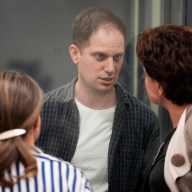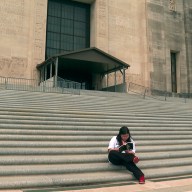 Ralph Fiennes plays a snooty concierge in Wes Anderson’s “The Grand Budapest Hotel.”
Ralph Fiennes plays a snooty concierge in Wes Anderson’s “The Grand Budapest Hotel.”
Credit: Getty Images
Ralph Fiennes isn’t often called on to do comedy, which is a shame as “The Grand Budapest Hotel” proves it’s one of his many talents. The latest from Wes Anderson, it stars Fiennes as an alternately snooty and juvenile European concierge accused of murder in the lead-up to World War II, who likes to pepper his flowery utterances with curse words and references to cat piss. This meant finding a way to strut his stuff with a director famous for his meticulous detail.
Apparently Wes Anderson wrote the part for you. How do you handle that when he approaches you to do the role?
I think the fact that he wrote [the part] for me emerged recently. He said, “When I wrote this I thought of you,” but it didn’t quite have the pressure of “I’m writing this FOR you.” It’s flattering and great, but I still go, “What bit of me did you see? I don’t have the perspective of me that you have.”
His writing is very precise. Is there wiggle room once actors come in?
One of the things that I wanted to do with Wes is find out where [the role] would be pitched. I think at first I approached it with too much affectation and an “over-Englishy” slightly forced diction. And he said, “No, no, no, relax that. It should be closer to your voice.” I think I knew what he meant. But sometimes he wanted me to push it back again. There’s a dial, and sometimes he’d say, “Let’s have it more affective,” or to make it a little more flamboyant, then dial it down, make it more naturalistic.
What is it that attracts actors to Wes Anderson, especially given how stylized his films are?
I think the actors like what the challenge is. You realize quite quickly that there’s a challenge in the delivery of the lines and the rhythm and often its connected to the camera moves. The challenge is to keep that spirit of likeness and at the same time you got to hit your mark. He wants the actors to invent and to breathe life into what he’s written. So he has the choreography mapped out, and all the actors know that. Part of the delight is trying to get it right and keep it seemingly spontaneous. Comedy often has to function like that.
Most of the film is shot in a box-shaped “Academy Ratio,” which is how all movies before 1954 were filmed. Was it at all strange for you as an actor to perform in that shape?
No, but there is one thing with the wide lenses. If you look at a horizontal line you can see it bowing. I couldn’t look at Tony [Revolori, his co-star]. If I looked at him it would look like I’m looking at something else. A lot of the time Wes drew a picture of the person so I could have a sense of your face. It’s hard. You couldn’t look at your scene partner.
Anderson made up his own country here, but it’s inspired by real nations in mid-Europe. Did you wind up doing research?
I knew a bit about [WWII-era Europe] from another film I did, called “Sunshine.” The first part of that film definitely focused on this period of time. This was completely different. Wes gave me this book [The World of Yesterday, by Stefan Zweig], which he says in the credits gave him a lot of inspiration for the feeling of this. It’s a brilliant book. It’s a Viennese-Jewish intellectual that’s witnessing the shift to the rise of Fascism. A very disturbing, heart-breaking book. That was my required reading. Also, “Beware of Pity,” another novel of Stefan Zweig. But I don’t think it was the type of film that required huge amounts of research.
You’ve now directed two films of your own. Has that changed how you approach screen acting?
What I’ve learned about directing is that you have an instinct on a day that could be wrong later. So when he said, “Let’s do lots of takes,” that reassured me because there would be a spectrum of stuff that he can play with. Because I’ve been through the editing process, and how you choose takes to make a performance. I’m more aware of how it’s good to have options. I know there are directors who know what they want and it impresses me, but I believe actors over a number of takes can find all kinds of things.
Follow Matt Prigge on Twitter @mattprigge
















